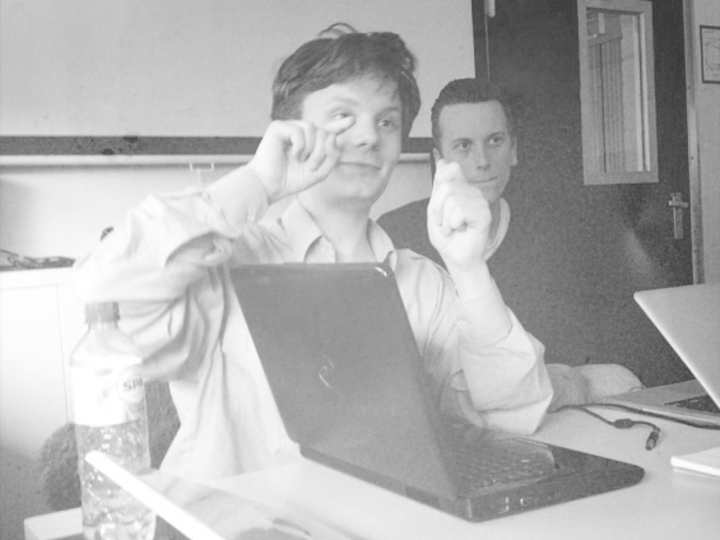The Alter Ego Festival is a university-wide course for third year students from the Royal Academy of Art and the Royal Conservatoire in The Hague.
In the Alter Ego Festival course, students temporarily take over each other’s artistic practice. The concept is based on the Alter Ego class cycle, which has been developed as part of the ArtScience curriculum by Sanne van Rijn and Taco Stolk.
Artists, and especially art students, often find it difficult to distinguish between their personality and their artistic practice. This is partially caused by the cult of personality and the myth of ‘individual expression’ that surrounds artists in our society. As a consequence it can be difficult for students to formulate clear questions about their own artistic methods – often these methods are cloaked in their thinking process by a, for the subconscious apparently elusive, ‘personal test’.
In the Alter Ego Festival course, students from the academy and the conservatoire exchange identities. During this period each student makes a work in the style of another student (from a different artistic discipline). By doing so, the student is challenged to dive deep into the motivations and working methods of artistic practice and to make it communicable from two different angles: on the one hand by requiring the student to relate in-depth to the specific characteristics of another student’s work, and on the other hand by forcing the student to explain his methods as clearly as possible to the student who takes his place.
Students are recruited from all ‘autonomous’ disciplines from the University of the Arts, in consultation with the heads of the diverse deparments. A total of 20 students can participate. The participating departments are: Composition, Sonology, ArtScience and Fine Arts. For the first day of the course, all students prepare a short presentation about their work to introduce their artistic practice to the group.
Students are not grouped in pairs but in chains: student A assumes the role of student B, student B the role of student C, student C the role of student D, and student D the role, for example, of student A. During the introduction day, the course leaders divide the students into these chains based on the informative differences between the students’ methods. This optimally shapes the prerequisites for being able to identify with one another.

The trajectory consists of seven consecutive weeks in addition to the regular curriculum. It starts with an introduction day and is concluded with the Alter Ego Festival: an evening with performances and the on-site realisation of works. In the in-between weeks, each student works independently with the two partner-students. Every two weeks students discuss their experiences with the group and the course leaders. During the two days before the festival evening the students prepare their collective presentations with the course leaders and a stage director.
This course offers the opportunity for students to expand their artistic practice in a unique way – by experiencing new working methods and disciplines and additionally by crossing a boundary in the understanding of their own work.
Students from the autonomous art departments at the Royal Academy of Art and the Royal Conservatoire will create new work by adopting each other’s style, methodology and/or discipline. These students will present and discuss these works on a special edition CASS evening on Monday 26 March 2012 in the Schönbergzaal of the Royal Conservatoire.
HERE you can listen to a work made by one of the participants of the Alter Ego Festival: Lasse Passage.In this sound play you hear the artist Lasse Passage interviewing Mr. HorseMagic on the subject of music, art and commercialism. It was made in an alter-ego attempt of being Pia Louwerens.
The course is conducted by Taco Stolk and Irene Fortuyn.
TACO STOLK
is a conceptualist and serial modernist based in Amsterdam (NL). He is the initiator of WLFR, studio for conceptualism. Since the mid-nineties WLFR develops meta-media projects and theory concerning the aesthetics of concepts and contextual technology, often at the intersection of art and science. Stolk graduated from the ArtScience Interfaculty in The Hague, earning his Master’s degree summa cum laude in 2004. He also co-founded ‘formalism’ (concept & design creators) and ‘ConceptsAssociated’ (idea agency) and is chairman of the ‘eCulture’ Committee of the Dutch Arts Council. His is a lecturer and supervisor at, among others, the ArtScience Interfaculty of the Royal Conservatoire and the Royal Academy of Art in The Hague, and the PhDArts and MediaTechnology-MSc programmes of Leiden University.
IRENE FORTUYN
worked in close collaboration with Robert O’Brien from 1983 to 1988. Their work focused on the issue of the position of the artwork and its possible perceptions. After O’Brien’s death Fortuyn continued to work under the name Fortuyn/O’Brien until 2005. Since then she has been working as Irene Fortuyn. She is currently a doctoral student at PhDArts, University Leiden. ‘Portrait of the Dutch Landscape’ is a visual research into the relationship between the Netherlands as we imagine it to be and the physical reality of the Dutch landscape. Irene Fortuyn is head of the Man and Leisure Department at the Design Academy Eindhoven and lecturer at the Royal Academy of Art in The Hague.